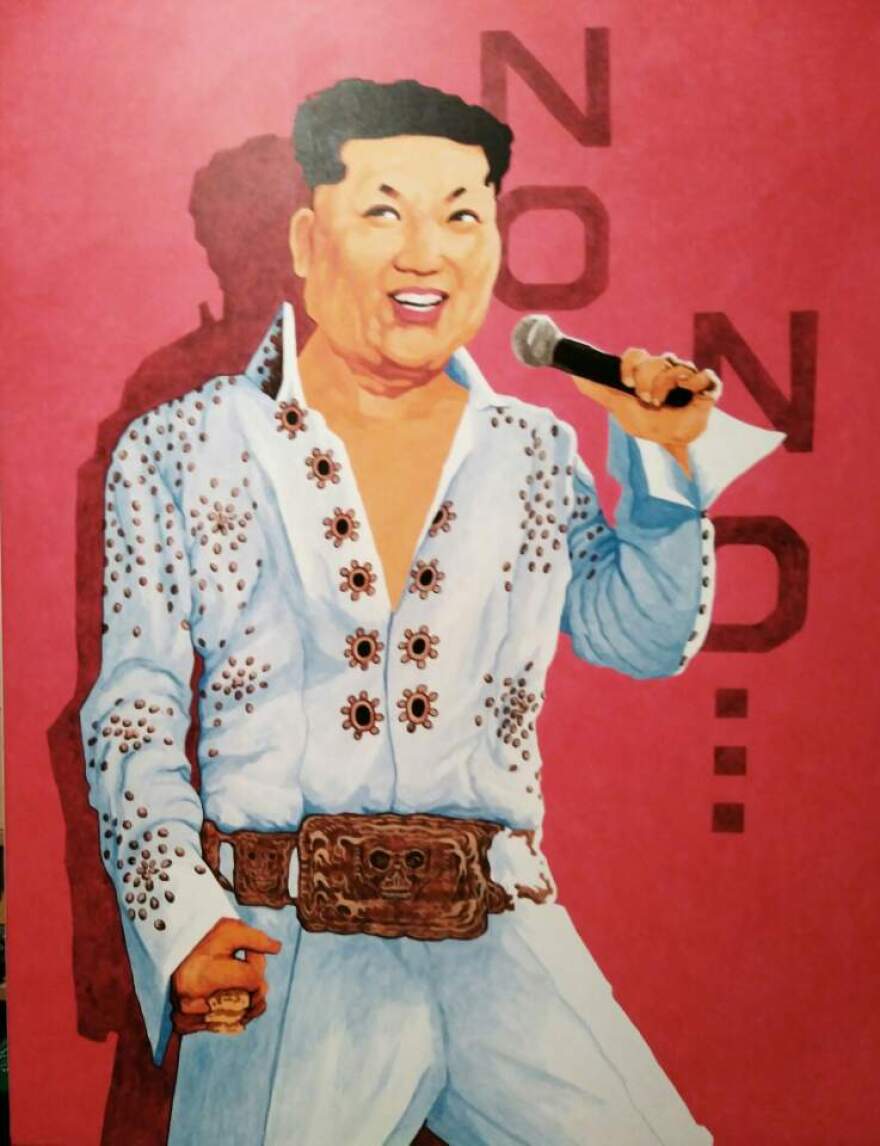Graphic artist Byeok Song created propaganda for the North Korean regime in the 1990’s. During the economic depression there, hunger led to prison time for him, and to his escape through China to South Korea. Song now works under an alias to protect his family, using art to bring attention to his homeland. HPR’s Noe Tanigawa reports.

North Korean propaganda artist Byeok Song was in Honolulu recently In conjunction with a seminar on “The North Korean Diaspora: Art and Politics.” Organized by Assistant Professor C. Harrison Kim (History, UH M?noa), the event included a display of Song’s work.

There is no advertising in North Korea, so propaganda artist Byeok Song’s messages didn’t have to compete for attention at all.
Song: Of course, I felt a great sense of ride doing this type of work. I realized I was drawing propaganda praising the Great Leader, the Dear General, Kim Il Sung and Kim Jung Il. And I felt I needed to work harder, I needed to do more. I remember many nights I would draw and paint without sleeping because I felt this sense of duty to be loyal and continue this work.
It must have felt great to be so driven by an inner impulse.
Song: Of course, you’re right, because ever since we were kids growing up in North Korea, we were taught that to serve the Great Leader was the greatest thing that we North Korean citizens could do. So I felt a great a great sense of pride in doing this work as a propaganda artist for the regime.
Asked what happened? Song says it’s simple—I was hungry.
Song: When things got really bad in North Korean, I would say there’s literally nothing I did not eat. I ended up peeling tree bark off a tree and boiling that and eating that to deal with my hunger. When there was really nothing else to eat, sometimes we would put a little salt into water and just drink that and try to deal with the hunger. Unless you’ve actually experienced it, it’s very difficult for someone to understand what it feels like o go through hunger and starvation.

Song: My father and I decided to, not escape from North Korea, but to simply cross over to China by crossing a river to seek some food. In the process, my father was swept away by the river. He drowned and I never found his body. As a result, I went to the border guards on the North Korean side to seek help, but instead of getting help, I was beaten, arrested and sent to a labor reform prison camp. Here is where I experienced Hell.
Song: That’s when I realized, Why are my fellow North Koreans and myself, why are we punished for the simple crime, if you can call it that, of wanting to go to a neighboring country to find food? That’s when I basically had a change of heart. I snapped awake from the propaganda I had believed in. I realized that even if I die trying, I had to escape from this country, North Korea, and find a better life for myself.
In the extended interview, Song describes his prison time in North Korea. He thinks they released him on the verge of death so as not to have to bother with his body. He escaped to China, and finally to South Korea in 2002. In 2003, Song enrolled in art school and began painting again.

At first, Song’s images revolved around freedom, landscapes, a boy sprouting wings. In 2011, Song went back to Kim Jong Il as subject matter, depicting him as Marilyn Monroe holding his/her skirt down over a subway grate (from The Seven Year Itch.) Since then, Song has produced a number of works featuring Kim Jong Eun as well.
Song: That is why, as somebody who knows so well about the true nature of the North Korean regime, as somebody who lived and suffered in that country, whenever I have these exhibitions I want to remind people that even right now under Kim Jong Eun, there are 25 million people in North Korea who are living basically like slaves.




